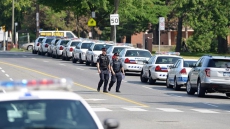It was Sonya Nadine Mae Cywink's 31st birthday when she went missing in Ontario in mid-August of 1994.
She was with child.
She had been planning to celebrate her birthday by meeting her sister, Meggie Cywink, at a Toronto Blue Jays game. But she never showed up.
Eleven days later, her body was found at the Southwold Earthworks National Historical Site, south of London, Ont., wearing only a T-shirt and socks. Her cause of death was described as blunt force trauma.
"Obviously, my grief, and the anxiety of never knowing what happened in the final moments of Sonya's life have haunted me," Cywink said Wednesday.
She said she is disappointed the massive three-year effort of the National Inquiry on Missing and Murdered Indigenous Women and Girls has not led to change.
"Families, communities, and allies have not received any information about what governments — either federal or provincial — have been doing over the past year on this file," she said.
"I can tell you that, whatever it is, it has had little or no impact on the families left behind," Cywink said. "It has brought us no solace and it has not changed the violence we witness or the genocide we survive."
The inquiry delivered its final report June 3, 2019, concluding that decades of systemic racism and human rights violations had contributed to the deaths and disappearances of hundreds of Indigenous women and girls and that it constituted a genocide.
In a report card released Wednesday to mark the anniversary of final report's release, the Native Women's Association of Canada found little has been done to address the inquiry's 231 calls for justice in the last 12 months. It awarded the federal government a "resounding fail."
"Instead of a national action plan, we are left with a lack-of-action plan," said association president Lorraine Whitman.
"The sad fact is, we cannot afford to do nothing in the face of the violence that continues to take the lives of First Nations, Metis and Inuit women."
Last week, Crown-Indigenous Relations Minister Carolyn Bennett said Ottawa is delaying its intended release of the national action plan this month because of the COVID-19 pandemic.
Bennett said she understands the urgency of the situation and that people are impatient, but said many of the same people on the front lines of the COVID-19 response are also those Ottawa needs to work with on a national action plan.
Whitman said using the pandemic as an excuse for not delivering a plan is a "double slap in the face" to Indigenous women who are facing even greater risks of violence because of isolation measures aimed at slowing the spread of the novel coronavirus.
"These are things we have been trying to tell the government, but they have not been doing much listening," Whitman said.
In a joint statement Wednesday, the national inquiry's four commissioners said they "deplore inaction on the part of some governments."
"As the final report asserts, the calls for justice are not mere recommendations or a quaint list of best practices — they are legal imperatives rooted in Canada’s obligations under international and domestic human rights norms and laws," the commissioners said.
"As the ongoing levels of violence attest, the fundamental human rights and Indigenous rights of Indigenous women, girls and (two-spirit) people continue to be violated daily in Canada, and Indigenous women, girls and (two-spirit) people continue to be subjected to colonial violence, physical violence, disappearances and murder."
Bennett, Women and Gender Equality Minister Maryam Monsef, Justice Minister David Lametti, Indigenous Services Minister Marc Miller, Canadian Heritage Minister Steven Guilbeault and Public Safety Minister Bill Blair also issued a statement to mark the anniversary.
In it, they said violence against Indigenous women is an "ongoing national tragedy" that governments are working to address.
While work on a national action plan continues, the ministers list a number of federal initiatives already in place to begin addressing issues identified in the inquiry's interim report, which was released in 2017, and the final report's calls for justice.
Those initiatives include: legislation to preserve Indigenous languages, legislation to give Indigenous communities control over their own child-welfare systems and the elimination of gender discrimination in the Indian Act.
"We recognize there is much more work to do and are committed to taking concrete actions that will help keep Indigenous women, girls, LGBTQ and two-spirit people safe and address the disempowering effects of colonization," the ministers say in their joint statement.
"We will continue our work with First Nations, Inuit and Metis people, and with provincial, territorial and municipal partners to respond to the calls for justice by putting in place a national action plan that is distinctions-based, regionally relevant, accountable and one in which outcomes are measured and the plan regularly adapted to ensure progress."




